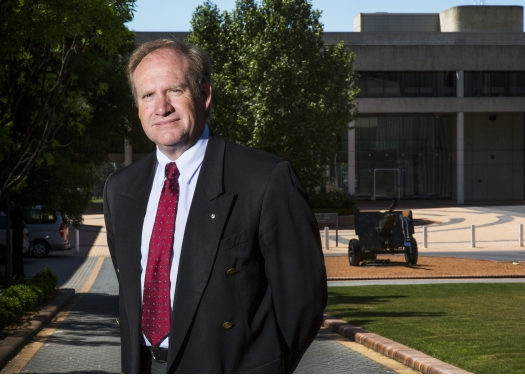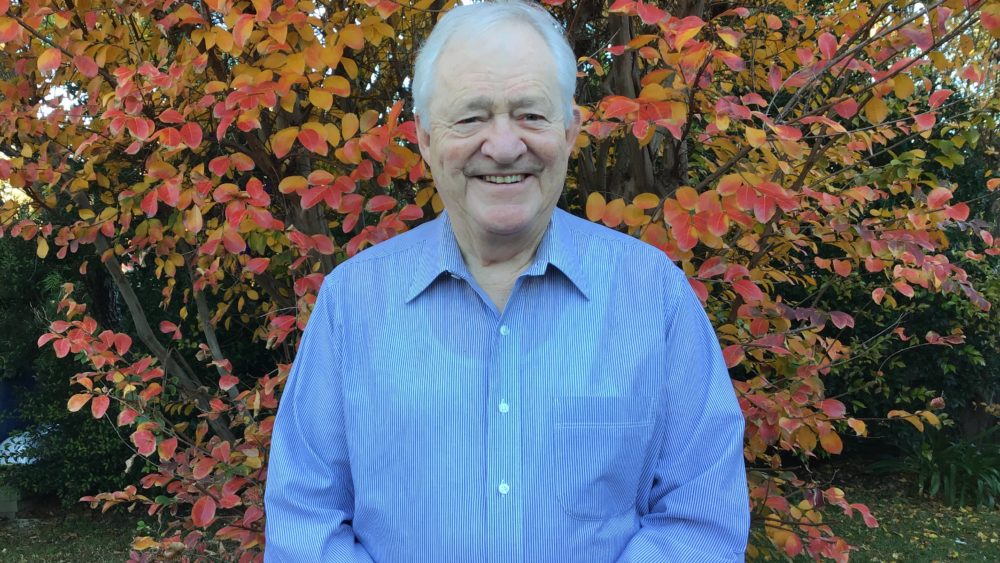Prolific authors, a futurologist and a journo honoured for pathbreaking works
Paul Barnett, Tom Frame, Keith Sutor and Peter Martin recognised in Queen’s Birthday List
Newly honoured author, theologian and historian Dr Paul Barnett says he is very encouraged to be reminded how his books have been a help to so many people, including this writer.
Dr Barnett, the former Bishop of North Sydney from 1990 to 2001, was honoured in this year’s Queen’s Birthday Honours list as a member of the Order of Australia (AM) for significant service to the Anglican Church of Australia.
Dr Tom Frame, author and former Bishop to the Defence Force, was also honoured with an AM for significant service to higher education, to the Anglican Church of Australia, and to the community.
It’s been lovely to receive so many lovely emails and other messages, which reminded me that basically the books that I’ve written have been a help to so many people. That’s the really important thing. — Dr Paul Barnett
Dr Barnett, who is in the tradition of Sydney Anglican scholar bishops, said today that his honour was a surprise.
“It never occurred to me it would happen. And it’s been lovely to receive so many lovely emails and other messages, which reminded me that basically the books that I’ve written have been a help to so many people. That’s the really important thing,” he told Eternity today.
For this writer, reading Barnett’s seminal Is The New Testament History? in the early 1990s was instrumental in me accepting Christ as I was confronted with what to do about the overwhelming historical evidence for the truth of the gospels, Acts and epistles.
Dr Barnett says he has always tried to write simply without jargon for the benefit of the non-specialist reader. As well as his books on New Testament background and the historical Jesus, he has written major Bible commentaries such as 2 Corinthians in the Bible Speaks Today Series and Revelation: Apocalypse Now and Then.
Dr Barnett said he has just written another book on the historical Jesus called Making the Gospels – Mystery or Conspiracy?
“I again am pursuing the line of historicity and probability, the question of the brevity of the lead time; and I discuss some of the conspiracy theories where Paul is the chief suspect on the one hand or Mark is the chief suspect,” he said.
“I try to demonstrate how flimsy is the proposition that these are the conspirators who have reshaped Jesus into their idea of what he truly was, namely a humble peasant rabbi or something like that. I just point out that the lead time between Jesus and the gospels is so brief – in the case of Mark only about 30 years – and all the information we have from the epistles by Paul and James and 1 Peter, which come between Jesus and the gospels, was all pointing in the same basic direction. The notion of conspiracy just won’t work.”
Dr Barnett says within a short time of being converted as a young man, he began asking his new Christian friends whether the New Testament was true. The question was still nagging at him while he was studying at Moore Theological College in Sydney.
His first eureka moment happened when he was in an ancient history lecture at the University of Sydney at age 29.
“One day when I was listening to a lecture on one of the Roman emperors, I realised that the source material was so much more remote for that person than it was for Jesus. That was a eureka moment when I realised the brevity of the time between Jesus and the documentation, particularly if you count Paul. There’s only 20 years between his earliest letter and the resurrection, so that really started me on a personal journey for further study,” he said.
In 1989, he and his wife Anita began leading study tours to the Middle East – he has just completed his 30th such tour – which led to another eureka moment.
“Just visiting the sites that the Bible speaks about and working out the relative distance and climate and things like that all helped me greatly to put the pieces of the jigsaw – that’s all contributed to my conviction about the history question and the geography question,” he said.
He said his conviction about the historical reliability of the New Testament had only deepened with the passing years.
“The evidence of history certainly does locate Jesus in a special place. It really makes him a challenge to us and, I guess like everybody else, I have my moments of doubt but I just keep on coming back to this truth question.”

Dr Tom Frame UNSW Sean Davey
Another prolific writer, Tom Frame – also a newly appointed a Member of the Order of Australia – has produced a stream of books that reflect his life as a naval officer, adoptee, the youngest bishop in Australia and an academic leader.
It’s likely that many readers have not connected the man who wrote Where Fate Calls: The HMAS Voyager Tragedy – which the ABC used for a Four Corners report on the collision between the Voyager and HMAS Melbourne – and Binding Ties, an account of his adoption. Or his books about religion in Australia. He has written 47 books in all.
To a casual reader it might have seemed as though there were several Tom Frames writing such a wide range of books.
Frame has been an outspoken Christian, using his 14 years in the navy and his time as bishop leading military chaplains as platforms.
As a young naval historian, he wrote an account of the HMAS Voyager tragedy, possibly the most sensitive topic he could have chosen at the time. According to the Sydney Morning Herald he came under pressure to drop his pursuit of the topic.
As a very public Christian, he attracted a storm of protest for supporting Australian troops joining the Iraq war – and even more attention for apologising for taking that stance.
In common with many adopted people, he found the birth of his first child extremely significant, no doubt contributing to his sensitive writing on adoption.
Frame led Canberra’s St Mark’s National Theological centre – a key centre of Charles Sturt University School of Theology – from 2006 and to 2014. He is currently director of the (former Prime Minister John) Howard Library in Canberra, an honorary Priest of Tarago, Currawang and Bungendore near Canberra, and (the Goulburn Post reports) a member of the Tarago Rural Fire service.
Andrew Cameron, Director of St Mark’s National Theological Centre, said today it was gratifying to see Tom’s name in this year’s list.
“Tom’s Christian faith and commitment to public life serves both the church and the community in various ways. He built up St Mark’s significantly during his long directorship here, to help make us a place of solid biblical and theological training. Since then, in his work as Director of ADFA’s Public Leadership Research Group, he has been able to add his Christian wisdom about leadership to a diverse and strategic forum; and his role to develop the Howard Library in Old Parliament House is a gift to the local and wider community.
“Prior to that he was, of course, Anglican Bishop to the Defence Forces. Throughout these roles he has also pastored local churches. In all this, Tom has modelled how to be clearly and overtly Christian, while at the same time cooperating with and adding to the work of others in the community. That’s a great way to be, and I’m glad it’s being recognised in the honours list.”
Another new Member of the Order of Australia is Peter Martin, best known as an economics journalist. Peter, along with his friend Ross Gittins, can claim to have invented the sort of economics reporting that makes sense to the ordinary reader or listener. “Listener” in the case of the ABC because Martin really introduced this sort of reporting to the national broadcaster.
After a long career at the ABC, including a stint as Tokyo correspondent, Peter became Economics Editor of The Age, and is Business and Economy Editor of The Conversation website.
Keith Suter, a futurologist who applied his skills to teasing out the possible future scenarios for the Uniting Church, has been made a member of the Order of Australia for “significant service to international relations, and to the Uniting Church in Australia”.
Suter is one of those rare people who has three doctorates. The first of these was about the international law of guerilla warfare (University of Sydney), the second about the social and economic consequences of the arms race (Deakin University) and a third doctorate on scenario planning (Sydney University).
That third doctorate was about the Uniting Church in Australia (UCA) in which Suter set out four “plausible futures”:
1. Word and Deed: A Uniting Church with a small number of large parishes, providing spiritual activities and social welfare.
2. Secular Welfare: Uniting Church congregations fade away, but a large social welfare movement remains.
3. Return to the Early Church: UCA re-invents itself.
4. Recessional: UCA is wound up and its assets dispersed.
When Eternity covered the Suter scenarios as the UCA turned 40 in 2017, a respected UCA leader responded: “It is possible to find some of all four scenarios.”
Andrew Dutney, past President of the Assembly of the Uniting Church in Australia and Principal of the Uniting College for Leadership and Theology in Adelaide, added: “I really appreciate Keith’s work in laying out those scenarios.”
Since 1992, Suter has also been a member of the prestigious Club of Rome – which is “an informal association of independent leading personalities from politics, business and science, men and women who are long-term thinkers interested in contributing in a systemic interdisciplinary and holistic manner to a better world. The Club of Rome members share a common concern for the future of humanity and the planet.”
He was president of the Centre for Peace and Conflict Studies (1991-1998) at the University of Sydney, and was a consultant on Social Policy with the Wesley Mission for 17 years.
Email This Story
Why not send this to a friend?


